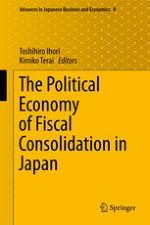2015 | OriginalPaper | Chapter
7. Budgets Under Delegation
Authors : Kimiko Terai, Amihai Glazer
Published in: The Political Economy of Fiscal Consolidation in Japan
Publisher: Springer Japan
Activate our intelligent search to find suitable subject content or patents.
Select sections of text to find matching patents with Artificial Intelligence. powered by
Select sections of text to find additional relevant content using AI-assisted search. powered by
